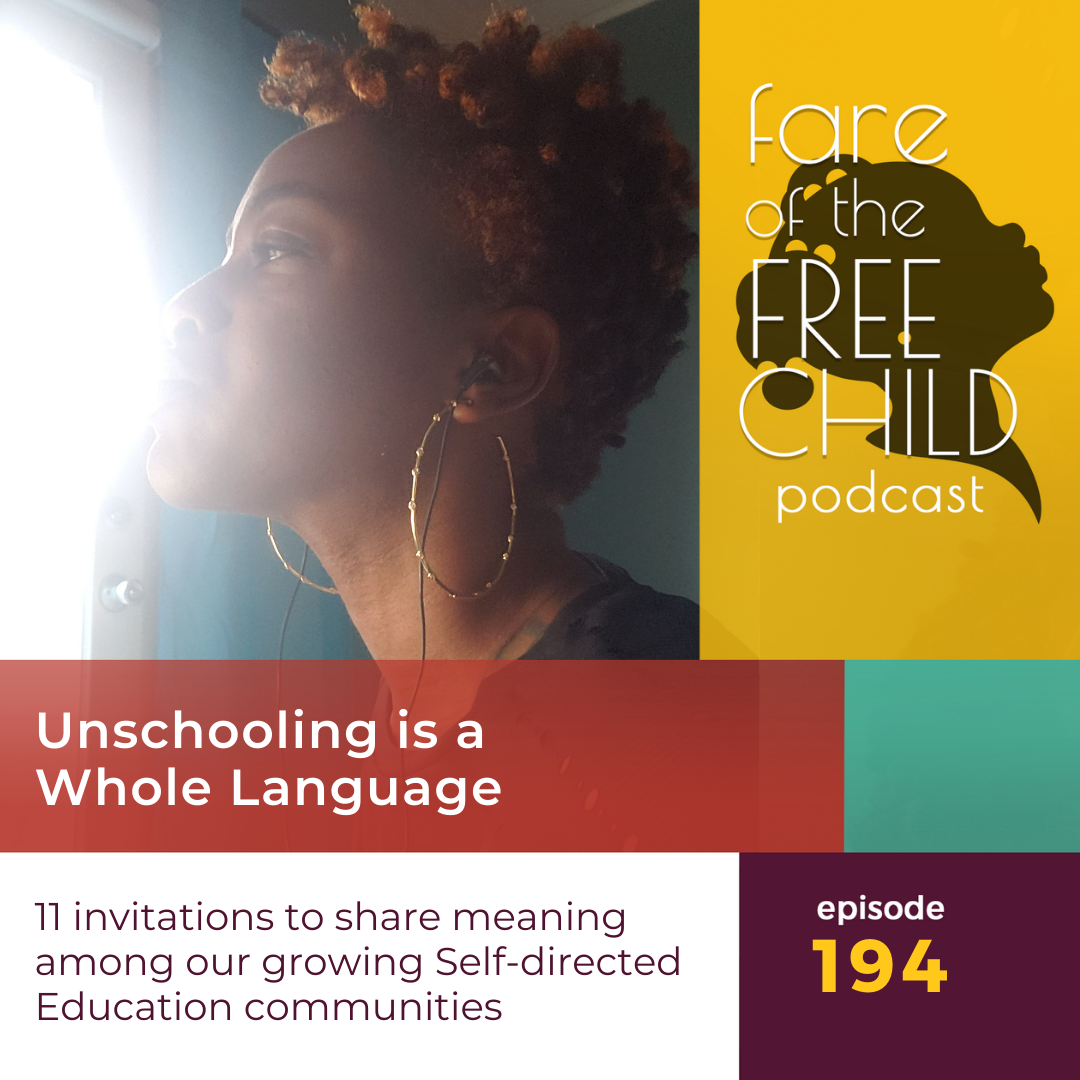Want to learn some unschooling vocabulary? If so, listen good because this episode brings a big opportunity to decide upon, and to question your own definitions and understandings, and pivot wherever the need arises. Add your own vocab to this. What words need to be on the next-next episode?
- Unschooling: A child-trusting, anti-oppression, liberatory, love-centered approach to parenting and caregiving. It is also creating and expanding communities of confident, capable people who understand how they learn best, and how to work collaboratively to learn and solve things.
- Self-Directed Education: A process that helps you develop a connection to your emotions; a connection that will transfer to your learning process and to your communication skills in all relationships.
- Re-parenting: Looking back, exploring and doing for yourself what wasn’t done for you, not against your parents or caregivers, but for you. Mothering/fathering ourselves.
- Shadow Work: If you missed it, listen to Genesis Ripley on episode 182: Genesis Ripley on Partnering with Our Pain, she shares the importance of Shadow Work and why we can’t continue to contemplate the world in a binary spectrum, ignoring the shadows, the nuances that are also part of it. We visit the unconscious, that is where Shadow Work happens.
- Change-up: A process of creating and iterating agreements based on underlying needs, values or desires. The agreements are worked on through various levels of practice, until they become fully integrated as a norm or new way of being. To learn more listen to Monique Allison and Thomas Parker in Episode 78: Surviving Survival Mode – Emerging Out.
- Schoolishness: As it is defined at schoolishness.com/: “Conventional practices that are rooted in binaries, and generally accepted by adults, but rejected by children and teenagers, either overtly or covertly. A living out of someone else’s goals or narratives of how and what we should be. Schoolishness models an authoritarian approach to adult-child interaction as well as respectability ideas rooted in the notion of adults’ innate superiority in knowledge.”
- Confident Autonomy: An ability to navigate the world with a strong sense of self that includes compassion for other people, and appreciation of being part of various communities, contributing to those communities and others on purpose and in love. Confident autonomy also includes an awareness of one’s own place in the world, as one, not the world, define it. It means giving space to have particular interests and decide on what to do to practice the skills that will help to be more than students who become adults with an education.
- Deschooling: Shedding the programming and habits that resulted from other people’s agency over your time, body, thoughts or actions; designing and practicing beliefs that align with your desire to thrive, be happy and succeed.
- Pervasive Whiteness: When a White person either unconsciously or deliberately asserts unsolicited opinions and ideas — using their voice, their body, or a particular approach / mindset — in ways that are dismissive of the voices, bodies, and experiences of those outside of their ingroup or culture. Because our dominant culture (speaking in the U.S. context) is White, and our education and politics are rooted in lesser opinions of non-White peoples, pervasive whiteness is our default, even among non-White people, because it has been a means of surviving for Black, non-Black Indigenous, and People of Color (BIPOC) communities for hundreds of years.
- Subject Sprint: As defined by Marley S. Richards: “When you study a specific topic for anywhere from 8 to 14 days, using resources to get a better understanding of the topic. Marley mostly uses Youtube channel crash-courses, then at the end of the sprint, writes a reflection, or does a recording talking about the topic”.
- Points of Access (PoFAS):
- Awareness: A detailed analysis of the various ways we come to learn and accept harmful relationship management tools. In the awareness phase we examine the colonization of our minds and the resulting actions.
- Disruption: Once you are clear on the dissonance between your existing habits patterns and your desired approach for raising free people, then we formulate ideas on how to disrupt those patterns.
- Deschooling: Transition from urgent disruption to a slow and steady practice of facing, naming and shedding that old normal.
- Unschooling: Deschooling rolling. The ongoing deschooling journey, partnership practice along the way, a relationship centered approach.
LIBERATION WALK
- Don’t forget that Kelly Limes Taylor’s second course Stories of Our Pasts is now open for enrollment
- Download 100 Ways To Be Cosmic! Howard Cosmonaut Palmer’s guide for becoming cosmic and learning the path to a Higher Self
- Grief, Growth and Goals podcast, hosted by Lou Hollis, is a healing space where we will chat with child talent, parents of talent, bookers, agents, agency owners, industry folk from the business aspect, to life, management and how one stays focused and grounded.
- Raising Free People Network’s Presence Counselors Leslie Bray and Anthony Galloway, Jr. are here to support unschooling and deschooling processes for families and organizations
- If you are hosting or are part of a Raising Free People Book Club please be sure to message Fatima@raisingfreepeople.com with the details about that book club
- Join patreon.com/akilah and support the show!
- Subscribe to Akilah’s Youtube Channel!








Join the discussion One Comment